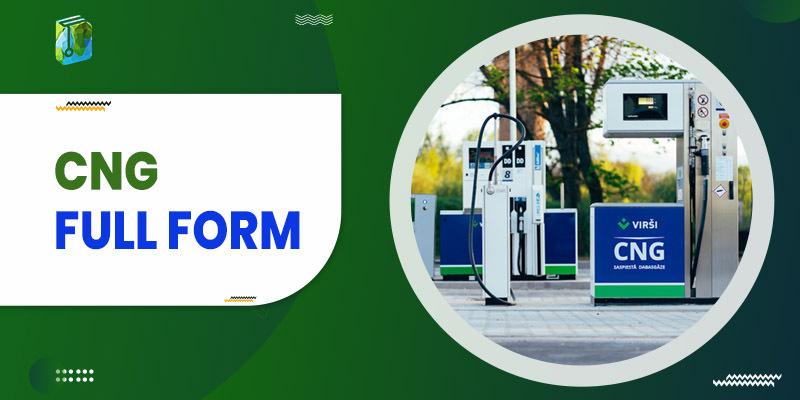CNG Full Form: The full form of CNG refers to Compressed Natural Gas. CNG is produced by compressing natural gas increasing its density to 200 bar -250 bar. It is mainly comprised of methane gas which is stored in the vehicle in high-pressure tanks and is transported through an extensive and complex network of pipelines from production areas to end-users.
This article contains the full form of CNG including its features, uses advantages, and disadvantages.
CNG Full Form
Methane is extracted by dwelling deposits or from landfills and wastewater treatment plants.
Although the gas contains more than 90 % of methane, several other substances may be mixed in with the raw gas such as water, hydrogen sulfide, carbon dioxide, liquid hydrocarbon condensate, and heavier gaseous hydrocarbons such as ethane, butane, and propane.
Properties of CNG
- Colorless
- Tasteless
- Odorless
- Non-toxic
- Non-corrosive
- 40% lighter than air
- High ignition temperature
Usage
CNG produces engine power after being mixed with air and fed into an engine’s combustion chamber. So, it can be used as a transportation fuel, a substitute for Diesel, Petrol and Propane/LPG.
It is primarily used in Buses and trucks all over the world. The first Natural Gas Vehicle (NGV) was registered in the U.S.
In India, it is used in Buses as well as in three-wheeler Autos.
It is also used as a fuel for the car.
Advantages of CNG
- It is more cost-effective than its other substitutes e.g. Petrol and Diesel.
- It is more environment-friendly because compared to gasoline, CNG vehicles emit far less carbon monoxide, nitrogen oxides and particulates.
- The maintenance expense for the vehicles that run on CNG is low as compared to the vehicles running on Petrol and Diesel.
- It facilitates a high auto-ignition temperature of 540 degrees Celsius or more.
- It enhances the life of lubricant oils used in vehicles because it does not contaminate and dilute the crankcase oil.
- Use of CNG makes the engine cleaner and more efficient by minimizing harmful carbon deposits when combusted.
Disadvantages of CNG
- CNG has a low energy density compared to liquid fuels. A gallon of CNG has three times less energy than in a gallon of gasoline. Hence CNG vehicles require spacious, bulky fuel tanks, making CNG practical mainly for large vehicles such as buses and trucks.
- CNG filling stations have limited availability.
Conclusion
CNG full form is CNG refers to Compressed Natural Gas. It is produced by compressing natural gas increasing its density to 200 bar -250 bar. Here in this post, we have explained what is CNG, advantages, disadvantages, and more in detail.

